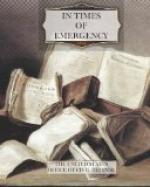WARNING
LEARN YOUR COMMUNITY’S WARNING SIGNALS. In most communities having outdoor warning systems, the Attack Warning Signal is a wavering sound on the sirens, or a series of short blasts on whistles, horns, or other devices. This signal will be used only to warn of an attack against the United States.
Many communities also are using an Attention or Alert Signal, usually a 3- to 5-minute steady blast to get the attention of their people in a time of threatened or impending peacetime emergency. In most places, the Attention or Alert Signal means that people should turn on their radio or television sets to hear important emergency information being broadcast.
You should find out now, before any emergency occurs, what warning signals are being used in your community, what they sound like, what they mean, and what actions you should take when you hear them.
Also, whenever a major storm or other peacetime disaster threatens, keep your radio or television set turned on to hear Weather Bureau reports and forecasts (issued by the Environmental Science Services Administration of the U.S. Department of Commerce), as well as other information and advice that may be broadcast by your local government.
When you are warned of an emergency, get your information on the radio or television. Use your telephone only to report important events (such as fires, flash floods, or tornado sightings) to the local authorities. If you tie up the telephone lines simply to get information, you may prevent emergency calls from being completed.
EMERGENCY SUPPLIES
A major disaster of almost any kind may interfere with your normal supplies of water, food, heat, and other day-to-day necessities. You should keep on hand, in or around your home, a stock of emergency supplies sufficient to meet your needs for a few days or preferably for a week.
If you stayed at home during the disaster, these supplies would help you live through the period of emergency without hardship. If you had to evacuate your home and move temporarily to another location, your emergency supplies could be taken with you and used en route or after you arrived at the new location (where regular supplies might not be available). Even if you only had to move to an emergency shelter station set up by a local agency, these supplies might be helpful to you, or make your stay easier.
The most important items to keep on hand are water (preferably in plastic jugs or other stoppered containers); canned or sealed-package foods that do not require refrigeration or heat for cooking; medicines needed by family members, and a first aid kit; blankets or sleeping bags; flashlights or lanterns; a battery-powered radio; and perhaps a covered container to use as an emergency toilet. In addition, an automobile in good operating condition with an ample supply of gasoline may be necessary in case you have to leave your home.




